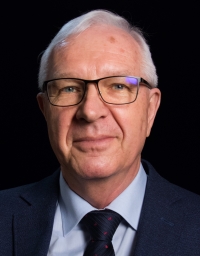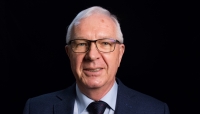Democracy and freedom are not granted automatically, they are worth fighting for

Stáhnout obrázek
Jiří Drahoš was born on February 20th 1949 in Jablunkov to a family of Jiří Drahoš Sr, a teacher born in Proseč near Skuteč, who in 1945, after the war had ended, left for Jablunkov in the Silesian borderlands to teach at a local school. There he married a local woman, Anna Klusová, who had been a nurse. Jiří has one brother, Josef. He spent his childhood and youth in Jablunkov, but he also had been profoundly influenced by his grandparents, as he spent summer holidays with them in Proseč in Vysočina region. His grandfather, Josef Drahoš, was a smoking pipe manufacturer; after the Communist coup in 1948 and nationalization of private enterprises, he refused to join the co-op. After being framed by a former Nazi informer who planted a gun on him and denounced him, he was arrested with his wife and imprisoned in Ilava from 1955 to 1957. His wife received a postponed sentence. Jiří graduated from secondary school in Jablunkov in 1967 and was admitted to the University of Chemistry and Technology in Prague (Praha). He had chosen to study physical chemistry as a field of study as it was considered difficult and exclusive. In Prague, he witnessed the Prague Spring of 1968 filled with euphoria and saw the Warsaw Pact invasion of August 1968 in Jablunkov. In the fall of 1968, he participated in protests and also in the strike during which students occupied university buildings. In 1969, he was deeply moved by the self-immolation of Jan Palach‘s, whose funeral he had attended. During his fifth year at the university, in 1972, he met his future wife, Eva Choděrová, a librarian at the Academy of Sciences born in Vysočina. In 1973, he joined a physical chemistry group at the Institute of Chemical Process Fundamentals at the Czech Academy of Sciences in Suchdol, led by Eduard Hála, a non-Party member, who created a free-thinking atmosphere in his department. In 1977, Jíří defended his thesis „Rovnováha kapalina-pára za vyšších tlaků. Generalizovaná metoda výpočtu” and got a Candidate of Sciences (Csc.) degree. In the same year, he won the ČSAV (Czech Academy of Sciences) prize. Since 1978, he had been working as a researcher at the chemical reactor department, in a group dealing with modeling and control of chemical-engineering processes. In 1979, he had been invited to become a State Security informer, yet he had declined the offer without hesitation. From 1985 to 1986, he was a Humboldt foundation scholar at the University of Hanover in the Federal Republic of Germany. In January 1989, he joined protests in Prague‘s centre during the so-called ‚Palach week‘ and witnessed the events of November 17th 1989 with a Canticorum iubilo choir with whom he performed at a festival in Jihlava. After that, he founded a Civic Forum (Občanské Fórum) branch at work, had been elected a trade union chairman and had been promoting the Civic Forum‘s revolutionary ideas during the management meetings. From 1992 to 1994, he was the deputy director at the Institute of Chemical Process Fundamentals, from 1995 to 2003, he had been serving as its director. After that, he was the deputy research director at the Institute till August 2005. Since 1994, he was an associate professor in chemical engineering at the University of Chemistry and Technology in Prague, getting a DrSc. degree in 1999. Since 2003, he has been professor in chemical engineering. From 2009 to 2019, he was the president of the Czech Academy of Sciences. He was a candidate for presidency in the Czech election of 2017. He qualified for the second round held in January 2018 with Miloš Zeman, his opponent, losing by a narrow margin of 2.5 percent of votes. In October 2018, he won the Senate election in Prague‘s Fourth District (Praha 4). He brought up two daughters with his wife, Eva Drahošová.

